中考英语复习方案-并列句
图片预览

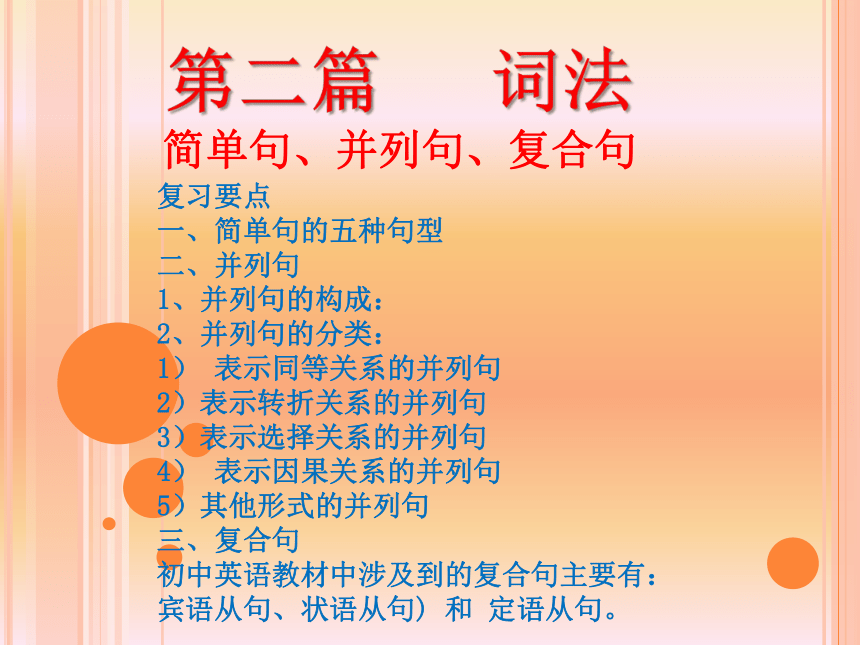
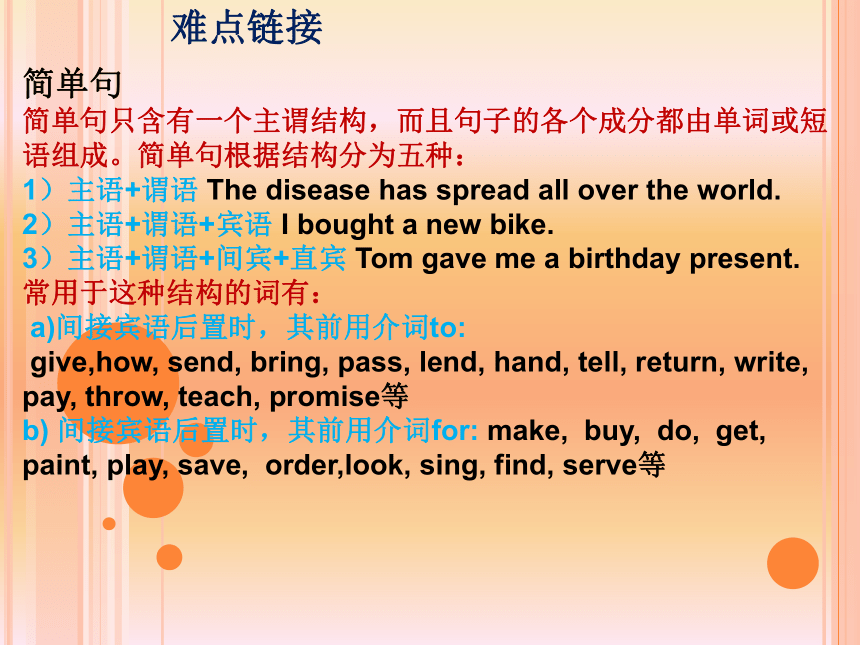
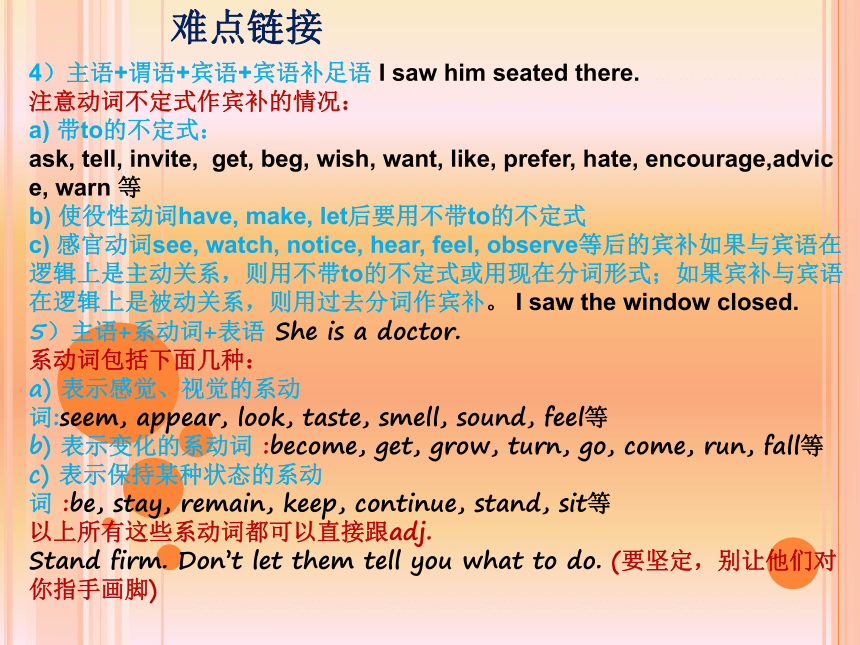
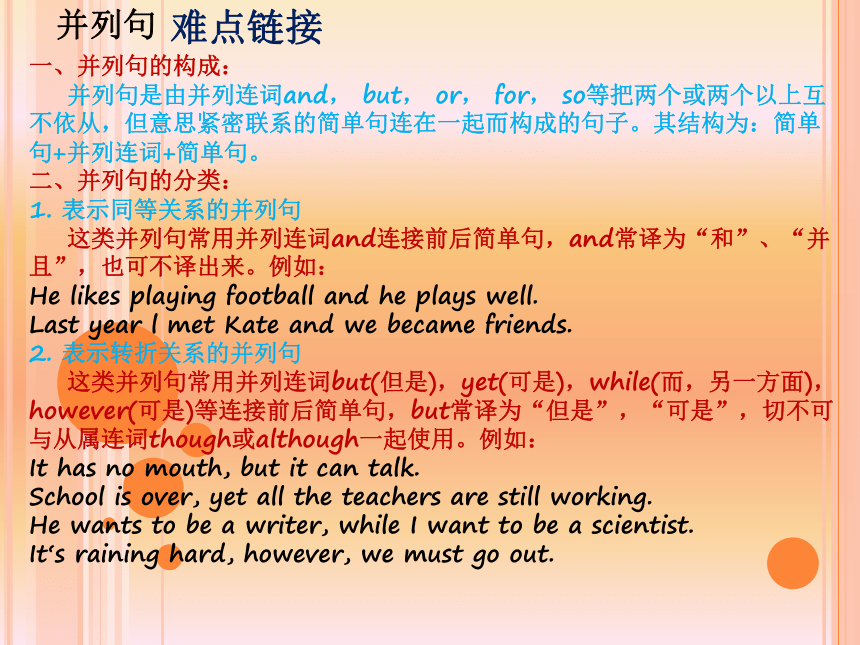
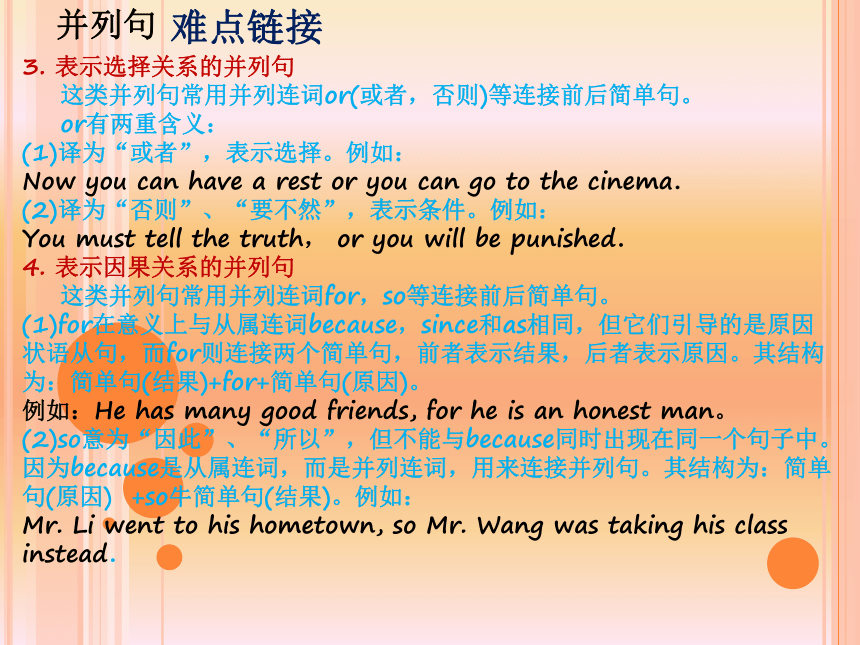
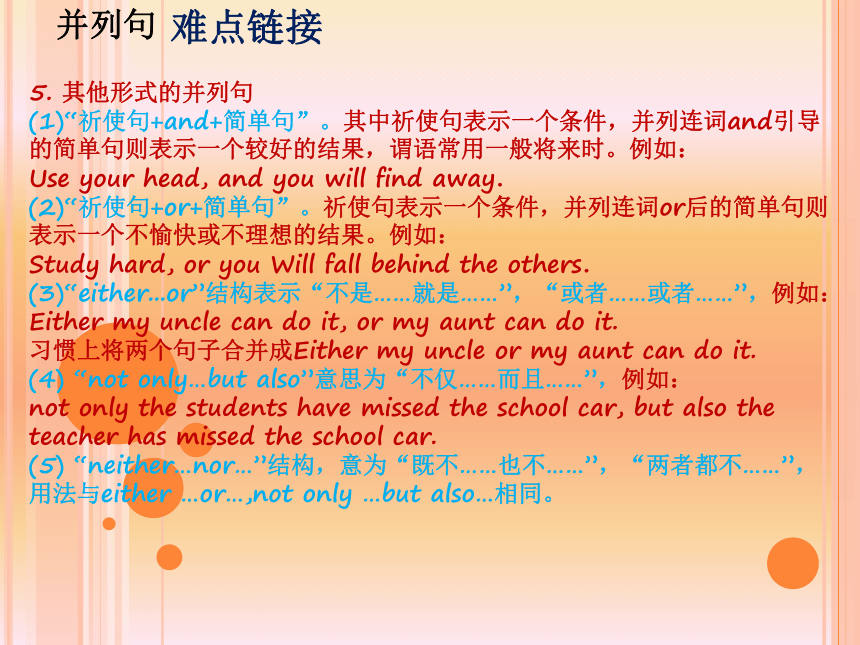
文档简介
课件17张PPT。中考英语复习方案
语法部分第二篇 词法
简单句、并列句、复合句复习要点
一、简单句的五种句型
二、并列句
1、并列句的构成:
2、并列句的分类:
1) 表示同等关系的并列句
2)表示转折关系的并列句
3)表示选择关系的并列句
4) 表示因果关系的并列句
5)其他形式的并列句
三、复合句
初中英语教材中涉及到的复合句主要有:宾语从句、状语从句) 和 定语从句。
简单句
简单句只含有一个主谓结构,而且句子的各个成分都由单词或短语组成。简单句根据结构分为五种:
1)主语+谓语?The?disease?has?spread?all?over?the?world.
2)主语+谓语+宾语?I?bought?a?new?bike.
3)主语+谓语+间宾+直宾?Tom?gave?me?a?birthday?present.
常用于这种结构的词有:
a)间接宾语后置时,其前用介词to:
?give,how,?send,?bring,?pass,?lend,?hand,?tell,?return,?write,?pay,?throw,?teach,?promise等
b)?间接宾语后置时,其前用介词for: make,? buy,? do,??get,? paint,?play,?save,??order,look,?sing,?find,?serve等
??
?
难点链接4)主语+谓语+宾语+宾语补足语?I?saw?him?seated?there.
注意动词不定式作宾补的情况:
a)?带to的不定式:ask,?tell,?invite,??get,?beg,?wish,?want,?like,?prefer,?hate,?encourage,advice,?warn 等
b)?使役性动词have,?make,?let后要用不带to的不定式
c)?感官动词see,?watch,?notice,?hear,?feel,?observe等后的宾补如果与宾语在逻辑上是主动关系,则用不带to的不定式或用现在分词形式;如果宾补与宾语在逻辑上是被动关系,则用过去分词作宾补。 I?saw?the?window?closed.?
5)主语+系动词+表语?She?is?a?doctor. 系动词包括下面几种: a) 表示感觉、视觉的系动词:seem,?appear,?look,?taste,?smell,?sound,?feel等 b) 表示变化的系动词 :become,?get,?grow,?turn,?go,?come,?run,?fall等 c) 表示保持某种状态的系动词 :be,?stay,?remain,?keep,?continue,?stand,?sit等 以上所有这些系动词都可以直接跟adj. Stand?firm.?Don’t?let?them?tell?you?what?to?do.?(要坚定,别让他们对你指手画脚) 难点链接一、并列句的构成: 并列句是由并列连词and, but, or, for, so等把两个或两个以上互不依从,但意思紧密联系的简单句连在一起而构成的句子。其结构为:简单句+并列连词+简单句。
二、并列句的分类:
1. 表示同等关系的并列句 这类并列句常用并列连词and连接前后简单句,and常译为“和”、“并且”,也可不译出来。例如: He likes playing football and he plays well. ?
Last year l met Kate and we became friends. ?? 2. 表示转折关系的并列句 这类并列句常用并列连词but(但是),yet(可是),while(而,另一方面),however(可是)等连接前后简单句,but常译为“但是”,“可是”,切不可与从属连词though或although一起使用。例如: It has no mouth, but it can talk. School is over, yet all the teachers are still working. He wants to be a writer, while I want to be a scientist. It‘s raining hard, however, we must go out. 并列句难点链接3. 表示选择关系的并列句 这类并列句常用并列连词or(或者,否则)等连接前后简单句。 or有两重含义:? (1)译为“或者”,表示选择。例如: Now you can have a rest or you can go to the cinema. (2)译为“否则”、“要不然”,表示条件。例如: You must tell the truth, or you will be punished. 4. 表示因果关系的并列句 这类并列句常用并列连词for,so等连接前后简单句。 (1)for在意义上与从属连词because,since和as相同,但它们引导的是原因状语从句,而for则连接两个简单句,前者表示结果,后者表示原因。其结构为:简单句(结果)+for+简单句(原因)。 例如:He has many good friends, for he is an honest man。 (2)so意为“因此”、“所以”,但不能与because同时出现在同一个句子中。因为because是从属连词,而是并列连词,用来连接并列句。其结构为:简单句(原因)? +so牛简单句(结果)。例如: Mr. Li went to his hometown, so Mr. Wang was taking his class instead. 并列句难点链接 5. 其他形式的并列句 (1)“祈使句+and+简单句”。其中祈使句表示一个条件,并列连词and引导的简单句则表示一个较好的结果,谓语常用一般将来时。例如: Use your head, and you will find away. (2)“祈使句+or+简单句”。祈使句表示一个条件,并列连词or后的简单句则表示一个不愉快或不理想的结果。例如: Study hard, or you Will fall behind the others. (3)“either...or”结构表示“不是……就是……”,“或者……或者……”,例如: Either my uncle can do it, or my aunt can do it. 习惯上将两个句子合并成Either my uncle or my aunt can do it. (4) “not only…but also”意思为“不仅……而且……”,例如: not only the students have missed the school car, but also the teacher has missed the school car. (5) “neither…nor…”结构,意为“既不……也不……”,“两者都不……”,用法与either …or…,not only …but also…相同。并列句难点链接三、使用并列句要注意的几种情况 1. 并列句有时可不用连词,而用分号隔开(前后句之间的关系须相当紧密)。例如: We fished all day; we didn't catch a fish.
2. 并列连词后的简单句如果与其前的简单句有相同的部分,则相同的部分常可省略。例如: My father works in a factory and my mother in a school. 3. 由so, nor, neither连接的并列句,后一简单句为避免重复,其成份常倒装并省略一些。例如: He is not a student, nor am I. Beibei can swim, so can I. 并列句难点链接3、复合句 复合句的某个成分,如主语、宾语、表语、同位语、定语、状语等,由另一个句子承当。 初中英语教材中涉及到的复合句主要有:The Object Clause (宾语从句)、The Adverbial Clause (状语从句) 和 The Attributive Clause (定语从句)。其它诸如主语从句、表语从句、同位语从句等形式的复合句尽管在教材中也有出现,但在中考中没有被列为重点考查范围。
难点链接1.[误] Both my parents are not here. They went to the concert just no
[正] Neither of my parents is here. They went to the concert just now. [析] 在英语中both一般用于肯定句中,如用于否定句中,其意义也不同于汉语,如:Both of us are not right. 在英语中应被理解为"我们俩不都对。"而Neither of us is right。 才能被理解为"我们俩无一正确"。
2.[误] He or his parents has some tickets for the film.
[正] He or his parents have some tickets for the film. [析] 由or 连接两主语时,谓语动词应与相临近的那一个主语保持一致。
3.[误] You should study hard, and you won't pass the exam.
[正] You should study hard, or you won't pass the exam. [析] or作为连词,这里的意思为"否则"。又如:Hurry up, or you'll be late for school.
4.[误] Though he is poor, but he is ready to help others.
[正] Though he is poor, he is ready to help others. [正] He is poor, but he is ready to help others. [析] "虽然……但是"是中文中的常用结构,但在英文中用了"虽然"则不要用"但是",用了"但是"则不能再用"虽然",二者只可用其一。 正误辨析5.[误] Either you or I are on duty.
[正] Either you or I am on duty. [析] either…or 连接两个主语时,其谓语动词与相临近的一个主语相呼应,这也叫作就近原则。类似的用法还有or, neither… nor, not only…but also等。
6.[误] Tom is our English teacher and teaching English in our school now.
[正] Tom is our English teacher and is teaching English in our school now. [析] 并列句中常常在后面的句子中作一些省略,以免重复,但不是所有词都可作任意的省略的。当你连接的是两个系动词时,后面的那个系动词不可省略,也就是讲连接的部分不可省略。
7.[误] My father likes swimming and to collect stamps.
[正] My father likes swimming and collecting stamps.
[析] 由并列连词连接的两个部分要保持相等的语法结构。如是动名词则都用动名词,如用不定式则都应用不定式,这是初学者要注意的一点。
8.[误] My father is reading a newspaper, I am doing my homework.
[正] My father is reading a newspaper while I am doing my homework. [析] 两个并列句中间不可用逗号连接,要用并列连词来连接。 正误辨析 9.[误] We will go both to Beijing and Shanghai.
[正] We will go to both Beijing and Shanghai. [析] 用both…and…作连接词时,其相连接的部分结构也要相同。
10.[误] Not only Mary but also her brothers is going to dance.
[正] Not only Mary but also her brothers are going to dance. [析] 由not only… but also…连接两个主语时,其重点在其后面的那一个主语,所以谓语形式应采用就近原则。
11. [误] The teacher as well as his students are coming.
[正] The teacher as well as his students is coming. [析] 由as well as 连接两个主语时,谓语动词与as well as 后面的名词无关,而与前面的名词相一致。
12. [误] Tom does not swim nor play football.
[正] Tom does not swim or play football. [析] nor主要用于连接句子的对等连词,如在否定句中连接某一部分时要用or, 但要注意句子的含意,如:This animal does not like a cow or a horse. 这个动物既不像牛也不像马。This animal does not like a cow but a horse. 这个动物不像牛而像马。
13.[误] After school some students play football, or others go to the library.
[正] After school some students play football, while others go to the library. [析] while在此处意为"而,然而"。
正误辨析选择填空
1. Give me one more minute ____ I’ll be able to finish it.
A. and B. or C. if D. so
2. Train as hard as you can ____ you’ll win the swimming competition.
A. Then B. but C. and D. or
3. I’m sorry to have to say this, ____ you forgot to turn off the lights when you left the room last night.
A. And B. but C. so D. because
4. John has not yet passed the driving test, and ____.
Henry hasn’t too B. Henry also has not either
C. neither Henry has D. neither has Henry
5. There are many sports lovers in his office. Some love climbing, ____ others enjoy swimming.
A. Or B. for C. while D. soAADDC课时训练6. ---- Do you feel like going out ____ would you rather have dinner at home?
---- I’d like to go out.
A. Or B. and C. but D. so
7. Mary went to bed early, ____ she felt very tired.
A. Or B. so C. for D. yet
8. Mother ____ a dress when she cut her finger.
A. was making B. makes C. is making D. made
9. He lay in bed ____ read something borrowed from library.
But B. and C. or D. yet
10. ---- I’d really like some lunch but I have so much work to do.
---- ____ what you want and I can get it for you.
Tell me B. If you would say to me C. You will tell me D. If you tell me
11. As he is strong, ____ can lift one hundred pounds.
A. yet he B. but he C. And D. he
12. ---- I thought you had an umbrella. ---- I had, ____ I’ve lost it.
A. Since B. but C. because D. so
ACABADB课时训练13. ---- I don’t like chicken ____ fish.
---- I don’t like chicken ____ I like fish very much.
A. and, and B. and, but C. or, and D. or, but
14. ---- Would you like to come to dinner tonight?
---- I’d like to, ____ I’m too busy.
A. and B. so C. as D. but
15. Would you like a cup of coffee ____ shall we get down to business right away?
A. and B. then C. or D. otherwise
16. She set out soon after dark ____ home an hour later.
arriving B. to arrive C. having arrived D. and arrived
17.Work hard, ___ you'll catch up with others.
A.and???? B.but?????? C.or????? D.for 18.Be quick, ___you'll be late for the football match.
A.so? B.but? C.and???? D.or 19.We bought Granny a present, _______ she didn't like it. A.but???? B.and?????? C.when???? D.if
DDCDADA课时训练20.The boy is only ten, _______ he can do some washing himself. ?? A.though??? B.but????? C.or??? D.so 21.He is listening to the music _______ she is washing clothes. ?? A.after???? B.before????? C.that????? D.while 22.He is rich, _______ he isn't happy.
A.or?????? B.so?????? C.and????? D.but 23. _______ Saturday _______ Sunday is OK.I will be free in these two days. ?? A.Either;or??? B.Neither;nor???? C.Both;and??? D.One;the other 24.Mr.Zhang felt very tired, _______ he needed a good rest. ?? A.and???? B.so????? C.or????? D.but 25. _______ human beings(人类) _______ animals can live without air. ?? A.Not only ;but also?? B.Both;and C.Either;or D.Neither;nor 26.—Have you got any brothers _______ sisters? —I have a sister. ?? A.nor??? B.or???? C.but???? D.for ?? A.so???? B.but???? C.and???? D.or 27.Jim is an American, _______ he can speak very good Chinese. ?? A.if???? B.so????? C.but????? D.because BDDABDBC课时训练See you next time!
语法部分第二篇 词法
简单句、并列句、复合句复习要点
一、简单句的五种句型
二、并列句
1、并列句的构成:
2、并列句的分类:
1) 表示同等关系的并列句
2)表示转折关系的并列句
3)表示选择关系的并列句
4) 表示因果关系的并列句
5)其他形式的并列句
三、复合句
初中英语教材中涉及到的复合句主要有:宾语从句、状语从句) 和 定语从句。
简单句
简单句只含有一个主谓结构,而且句子的各个成分都由单词或短语组成。简单句根据结构分为五种:
1)主语+谓语?The?disease?has?spread?all?over?the?world.
2)主语+谓语+宾语?I?bought?a?new?bike.
3)主语+谓语+间宾+直宾?Tom?gave?me?a?birthday?present.
常用于这种结构的词有:
a)间接宾语后置时,其前用介词to:
?give,how,?send,?bring,?pass,?lend,?hand,?tell,?return,?write,?pay,?throw,?teach,?promise等
b)?间接宾语后置时,其前用介词for: make,? buy,? do,??get,? paint,?play,?save,??order,look,?sing,?find,?serve等
??
?
难点链接4)主语+谓语+宾语+宾语补足语?I?saw?him?seated?there.
注意动词不定式作宾补的情况:
a)?带to的不定式:ask,?tell,?invite,??get,?beg,?wish,?want,?like,?prefer,?hate,?encourage,advice,?warn 等
b)?使役性动词have,?make,?let后要用不带to的不定式
c)?感官动词see,?watch,?notice,?hear,?feel,?observe等后的宾补如果与宾语在逻辑上是主动关系,则用不带to的不定式或用现在分词形式;如果宾补与宾语在逻辑上是被动关系,则用过去分词作宾补。 I?saw?the?window?closed.?
5)主语+系动词+表语?She?is?a?doctor. 系动词包括下面几种: a) 表示感觉、视觉的系动词:seem,?appear,?look,?taste,?smell,?sound,?feel等 b) 表示变化的系动词 :become,?get,?grow,?turn,?go,?come,?run,?fall等 c) 表示保持某种状态的系动词 :be,?stay,?remain,?keep,?continue,?stand,?sit等 以上所有这些系动词都可以直接跟adj. Stand?firm.?Don’t?let?them?tell?you?what?to?do.?(要坚定,别让他们对你指手画脚) 难点链接一、并列句的构成: 并列句是由并列连词and, but, or, for, so等把两个或两个以上互不依从,但意思紧密联系的简单句连在一起而构成的句子。其结构为:简单句+并列连词+简单句。
二、并列句的分类:
1. 表示同等关系的并列句 这类并列句常用并列连词and连接前后简单句,and常译为“和”、“并且”,也可不译出来。例如: He likes playing football and he plays well. ?
Last year l met Kate and we became friends. ?? 2. 表示转折关系的并列句 这类并列句常用并列连词but(但是),yet(可是),while(而,另一方面),however(可是)等连接前后简单句,but常译为“但是”,“可是”,切不可与从属连词though或although一起使用。例如: It has no mouth, but it can talk. School is over, yet all the teachers are still working. He wants to be a writer, while I want to be a scientist. It‘s raining hard, however, we must go out. 并列句难点链接3. 表示选择关系的并列句 这类并列句常用并列连词or(或者,否则)等连接前后简单句。 or有两重含义:? (1)译为“或者”,表示选择。例如: Now you can have a rest or you can go to the cinema. (2)译为“否则”、“要不然”,表示条件。例如: You must tell the truth, or you will be punished. 4. 表示因果关系的并列句 这类并列句常用并列连词for,so等连接前后简单句。 (1)for在意义上与从属连词because,since和as相同,但它们引导的是原因状语从句,而for则连接两个简单句,前者表示结果,后者表示原因。其结构为:简单句(结果)+for+简单句(原因)。 例如:He has many good friends, for he is an honest man。 (2)so意为“因此”、“所以”,但不能与because同时出现在同一个句子中。因为because是从属连词,而是并列连词,用来连接并列句。其结构为:简单句(原因)? +so牛简单句(结果)。例如: Mr. Li went to his hometown, so Mr. Wang was taking his class instead. 并列句难点链接 5. 其他形式的并列句 (1)“祈使句+and+简单句”。其中祈使句表示一个条件,并列连词and引导的简单句则表示一个较好的结果,谓语常用一般将来时。例如: Use your head, and you will find away. (2)“祈使句+or+简单句”。祈使句表示一个条件,并列连词or后的简单句则表示一个不愉快或不理想的结果。例如: Study hard, or you Will fall behind the others. (3)“either...or”结构表示“不是……就是……”,“或者……或者……”,例如: Either my uncle can do it, or my aunt can do it. 习惯上将两个句子合并成Either my uncle or my aunt can do it. (4) “not only…but also”意思为“不仅……而且……”,例如: not only the students have missed the school car, but also the teacher has missed the school car. (5) “neither…nor…”结构,意为“既不……也不……”,“两者都不……”,用法与either …or…,not only …but also…相同。并列句难点链接三、使用并列句要注意的几种情况 1. 并列句有时可不用连词,而用分号隔开(前后句之间的关系须相当紧密)。例如: We fished all day; we didn't catch a fish.
2. 并列连词后的简单句如果与其前的简单句有相同的部分,则相同的部分常可省略。例如: My father works in a factory and my mother in a school. 3. 由so, nor, neither连接的并列句,后一简单句为避免重复,其成份常倒装并省略一些。例如: He is not a student, nor am I. Beibei can swim, so can I. 并列句难点链接3、复合句 复合句的某个成分,如主语、宾语、表语、同位语、定语、状语等,由另一个句子承当。 初中英语教材中涉及到的复合句主要有:The Object Clause (宾语从句)、The Adverbial Clause (状语从句) 和 The Attributive Clause (定语从句)。其它诸如主语从句、表语从句、同位语从句等形式的复合句尽管在教材中也有出现,但在中考中没有被列为重点考查范围。
难点链接1.[误] Both my parents are not here. They went to the concert just no
[正] Neither of my parents is here. They went to the concert just now. [析] 在英语中both一般用于肯定句中,如用于否定句中,其意义也不同于汉语,如:Both of us are not right. 在英语中应被理解为"我们俩不都对。"而Neither of us is right。 才能被理解为"我们俩无一正确"。
2.[误] He or his parents has some tickets for the film.
[正] He or his parents have some tickets for the film. [析] 由or 连接两主语时,谓语动词应与相临近的那一个主语保持一致。
3.[误] You should study hard, and you won't pass the exam.
[正] You should study hard, or you won't pass the exam. [析] or作为连词,这里的意思为"否则"。又如:Hurry up, or you'll be late for school.
4.[误] Though he is poor, but he is ready to help others.
[正] Though he is poor, he is ready to help others. [正] He is poor, but he is ready to help others. [析] "虽然……但是"是中文中的常用结构,但在英文中用了"虽然"则不要用"但是",用了"但是"则不能再用"虽然",二者只可用其一。 正误辨析5.[误] Either you or I are on duty.
[正] Either you or I am on duty. [析] either…or 连接两个主语时,其谓语动词与相临近的一个主语相呼应,这也叫作就近原则。类似的用法还有or, neither… nor, not only…but also等。
6.[误] Tom is our English teacher and teaching English in our school now.
[正] Tom is our English teacher and is teaching English in our school now. [析] 并列句中常常在后面的句子中作一些省略,以免重复,但不是所有词都可作任意的省略的。当你连接的是两个系动词时,后面的那个系动词不可省略,也就是讲连接的部分不可省略。
7.[误] My father likes swimming and to collect stamps.
[正] My father likes swimming and collecting stamps.
[析] 由并列连词连接的两个部分要保持相等的语法结构。如是动名词则都用动名词,如用不定式则都应用不定式,这是初学者要注意的一点。
8.[误] My father is reading a newspaper, I am doing my homework.
[正] My father is reading a newspaper while I am doing my homework. [析] 两个并列句中间不可用逗号连接,要用并列连词来连接。 正误辨析 9.[误] We will go both to Beijing and Shanghai.
[正] We will go to both Beijing and Shanghai. [析] 用both…and…作连接词时,其相连接的部分结构也要相同。
10.[误] Not only Mary but also her brothers is going to dance.
[正] Not only Mary but also her brothers are going to dance. [析] 由not only… but also…连接两个主语时,其重点在其后面的那一个主语,所以谓语形式应采用就近原则。
11. [误] The teacher as well as his students are coming.
[正] The teacher as well as his students is coming. [析] 由as well as 连接两个主语时,谓语动词与as well as 后面的名词无关,而与前面的名词相一致。
12. [误] Tom does not swim nor play football.
[正] Tom does not swim or play football. [析] nor主要用于连接句子的对等连词,如在否定句中连接某一部分时要用or, 但要注意句子的含意,如:This animal does not like a cow or a horse. 这个动物既不像牛也不像马。This animal does not like a cow but a horse. 这个动物不像牛而像马。
13.[误] After school some students play football, or others go to the library.
[正] After school some students play football, while others go to the library. [析] while在此处意为"而,然而"。
正误辨析选择填空
1. Give me one more minute ____ I’ll be able to finish it.
A. and B. or C. if D. so
2. Train as hard as you can ____ you’ll win the swimming competition.
A. Then B. but C. and D. or
3. I’m sorry to have to say this, ____ you forgot to turn off the lights when you left the room last night.
A. And B. but C. so D. because
4. John has not yet passed the driving test, and ____.
Henry hasn’t too B. Henry also has not either
C. neither Henry has D. neither has Henry
5. There are many sports lovers in his office. Some love climbing, ____ others enjoy swimming.
A. Or B. for C. while D. soAADDC课时训练6. ---- Do you feel like going out ____ would you rather have dinner at home?
---- I’d like to go out.
A. Or B. and C. but D. so
7. Mary went to bed early, ____ she felt very tired.
A. Or B. so C. for D. yet
8. Mother ____ a dress when she cut her finger.
A. was making B. makes C. is making D. made
9. He lay in bed ____ read something borrowed from library.
But B. and C. or D. yet
10. ---- I’d really like some lunch but I have so much work to do.
---- ____ what you want and I can get it for you.
Tell me B. If you would say to me C. You will tell me D. If you tell me
11. As he is strong, ____ can lift one hundred pounds.
A. yet he B. but he C. And D. he
12. ---- I thought you had an umbrella. ---- I had, ____ I’ve lost it.
A. Since B. but C. because D. so
ACABADB课时训练13. ---- I don’t like chicken ____ fish.
---- I don’t like chicken ____ I like fish very much.
A. and, and B. and, but C. or, and D. or, but
14. ---- Would you like to come to dinner tonight?
---- I’d like to, ____ I’m too busy.
A. and B. so C. as D. but
15. Would you like a cup of coffee ____ shall we get down to business right away?
A. and B. then C. or D. otherwise
16. She set out soon after dark ____ home an hour later.
arriving B. to arrive C. having arrived D. and arrived
17.Work hard, ___ you'll catch up with others.
A.and???? B.but?????? C.or????? D.for 18.Be quick, ___you'll be late for the football match.
A.so? B.but? C.and???? D.or 19.We bought Granny a present, _______ she didn't like it. A.but???? B.and?????? C.when???? D.if
DDCDADA课时训练20.The boy is only ten, _______ he can do some washing himself. ?? A.though??? B.but????? C.or??? D.so 21.He is listening to the music _______ she is washing clothes. ?? A.after???? B.before????? C.that????? D.while 22.He is rich, _______ he isn't happy.
A.or?????? B.so?????? C.and????? D.but 23. _______ Saturday _______ Sunday is OK.I will be free in these two days. ?? A.Either;or??? B.Neither;nor???? C.Both;and??? D.One;the other 24.Mr.Zhang felt very tired, _______ he needed a good rest. ?? A.and???? B.so????? C.or????? D.but 25. _______ human beings(人类) _______ animals can live without air. ?? A.Not only ;but also?? B.Both;and C.Either;or D.Neither;nor 26.—Have you got any brothers _______ sisters? —I have a sister. ?? A.nor??? B.or???? C.but???? D.for ?? A.so???? B.but???? C.and???? D.or 27.Jim is an American, _______ he can speak very good Chinese. ?? A.if???? B.so????? C.but????? D.because BDDABDBC课时训练See you next time!
同课章节目录
- 词法
- 名词
- 动词和动词短语
- 动词语态
- 动词时态
- 助动词和情态动词
- 非谓语动词
- 冠词
- 代词
- 数词和量词
- 形容词副词及其比较等级
- 介词和介词短语
- 连词和感叹词
- 构词法
- 相似、相近词比较
- 句法
- 陈述句
- 一般疑问句和否定疑问句
- 特殊疑问句及选择疑问句
- 反意疑问句
- 存在句(There be句型)
- 宾语从句
- 定语从句
- 状语从句
- 主谓一致问题
- 简单句
- 并列句
- 复合句
- 主谓一致
- 主、表语从句
- 名词性从句
- 直接引语和间接引语
- 虚拟语气
- 感叹句
- 强调句
- 倒装句
- 祈使句
- 句子的成分
- 句子的分类
- 题型专区
- 单项选择部分
- 易错题
- 完形填空
- 阅读理解
- 词汇练习
- 听说训练
- 句型转换
- 补全对话
- 短文改错
- 翻译
- 书面表达
- 任务型阅读
- 语法填空
- 其他资料
